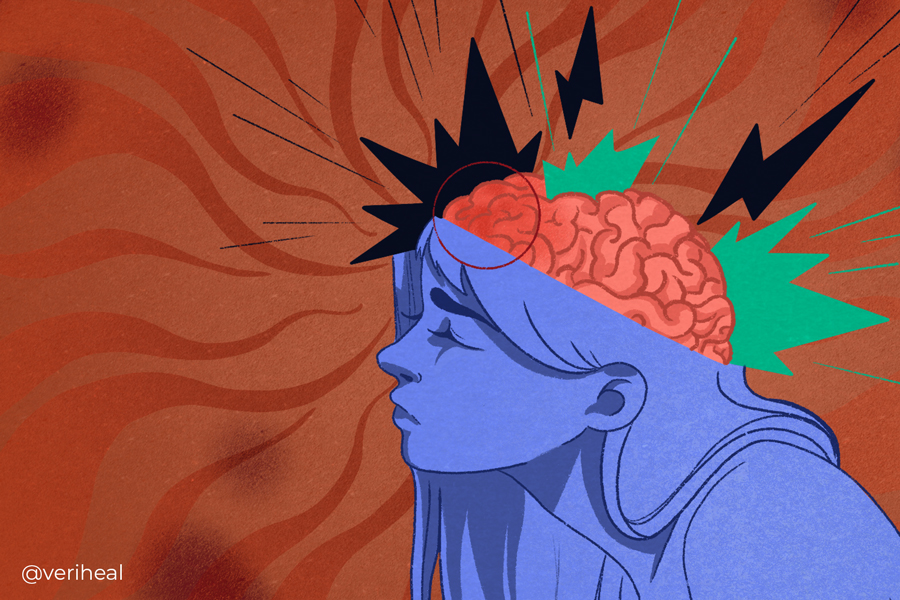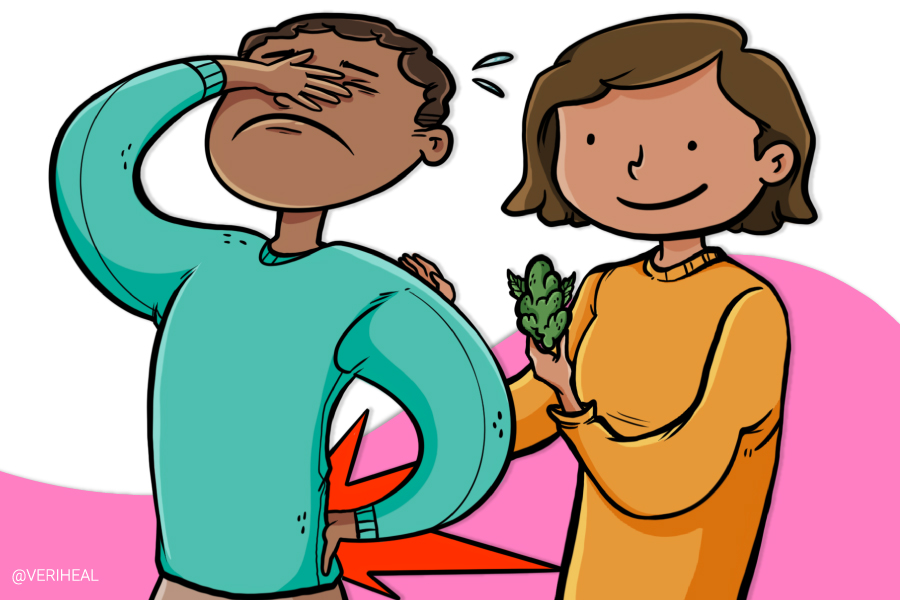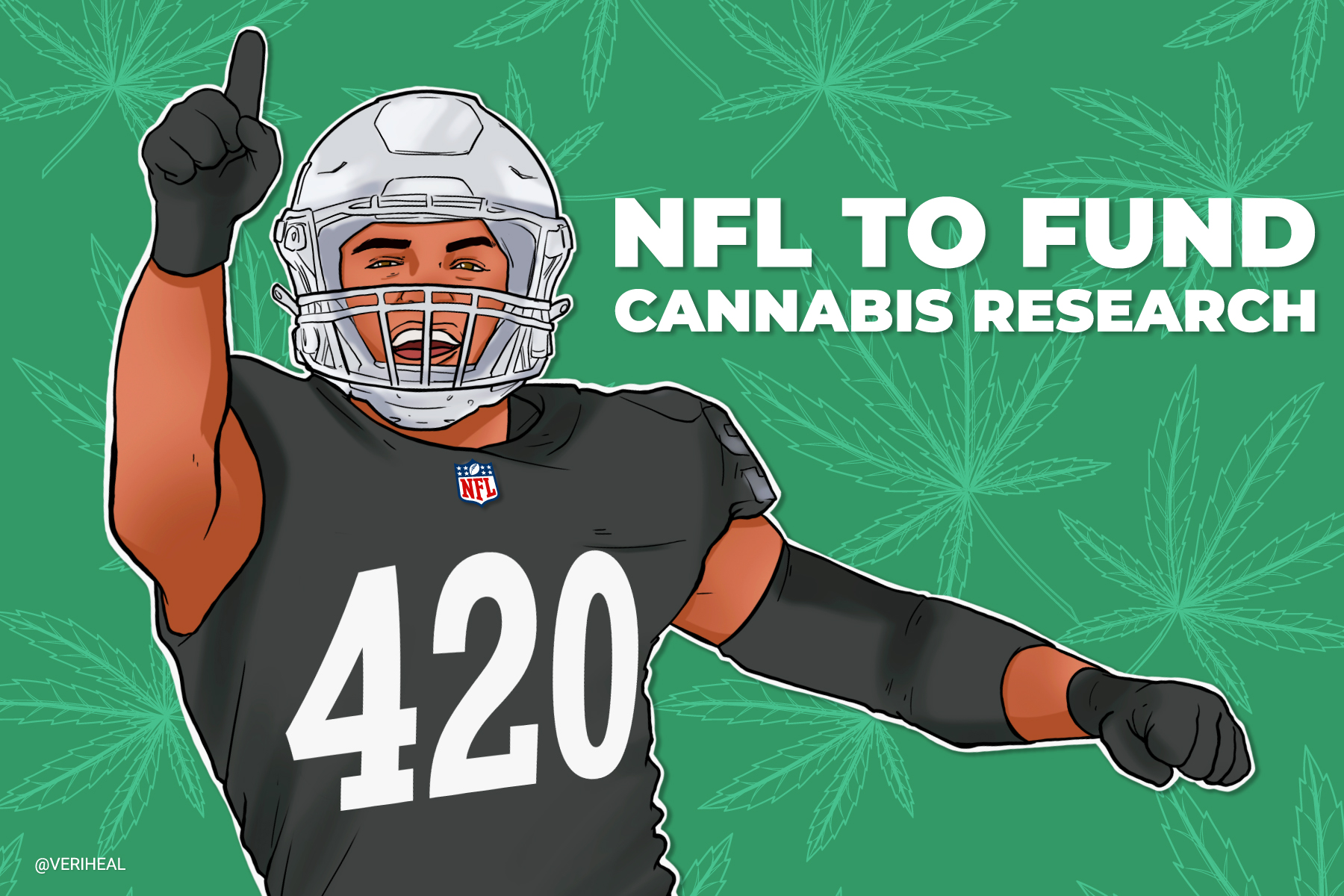Medical Marijuana May Help Patients Suffering from a TBI

- Traumatic Brain Injury and the Endocannabinoid System
- How Cannabidiol Helps TBIs
- Different Treatment Options for TBIs
- Medical Cannabis and TBIs: Considerations to Keep in Mind
- Understanding How TBIs are Classified
The impact of medical marijuana on traumatic brain injuries (TBIs) begins with its introduction into the endocannabinoid system (ECS). The ECS consists of endocannabinoids, or self-made fatty neurotransmitters such as anandamide (AEA) and 2-arachidonoylglycerol (2-AG). These neurotransmitters increase or decrease during cannabinoid use, which causes a variety of chemical processes that can help the brain after a bad head injury has occurred.
Cannabis typically works through cannabinoid receptors, including CB1 receptors found in the central nervous system and the brain and CB2 receptors that line peripheral tissues such as organs, immune cells, joints, and the skin. Interestingly, the ECS is also modulated at the time that the brain injury occurs to help protect and heal the brain and have neuroprotective effects. Unfortunately, some of these neurological responses cause secondary damage to the brain.
A variety of research has been conducted on the ECS as a pathway for treating TBIs and slowing tissue death, also known as ischemia in the brain. There is not yet sufficient clinical research done on TBI and medical cannabis on a large scale of patients. Further investigations are necessary to determine any clear clinical benefits of cannabis for TBI or its symptoms, although basic lab research is promising.
For more information on how the endocannabinoid system works, please see our page on endocannabinoids here.
Traumatic Brain Injury and the Endocannabinoid System
The ECS regulates cerebral blood flow, inflammation, and neuroplasticity in the brain (17). By introducing Δ9-tetrahydrocannabinol (THC) and other cannabinoids such as cannabidiol (CBD) through CB1 receptors, it can help regulate the endocannabinoids in the brain that naturally increase when a head injury occurs (14)(18).
The ability to modulate the ECS through the CB1 receptor varies by the time of day, the phase of brain tissue ischemia, and the endocannabinoid concentrations in the brain (14). For example, a brain injury at 1 am may be more difficult to treat via the ECS because CB1 receptor levels are lower at that time than they would be during 1 pm or awake hours.
CB2 receptors have also been targeted for treating TBIs, but unlike CB1 receptors, they do not vary based on the time of day. During and after severe head trauma, CB2 receptor numbers increase in the brain in response to the injury to help cells repair and survive through several mechanisms (14). CB2 receptors have been found to help regulate inflammation, immune function, and blood flow in the brain.
How Cannabidiol Helps TBIs
If a patient is worried about the psychoactive effects of cannabis, a patient may benefit from using cannabidiol (CBD) alone to help treat a severe TBI. CBD has the ability to function through many receptors other than just cannabinoid receptors during this repair process (5).
CBD For Neuroprotection
Astrocytes are the most numerous cells in the central nervous system, which includes the spinal cord and brain. They actively participate in brain development and activity, maintain tissue homeostasis in the brain, regulate neuronal growth, and support neuron signaling (10).
Research shows that when CBD is introduced into the central nervous system, proinflammatory functions and signaling in the astrocytes decrease (10). This reduces inflammation in the brain, causing neuroprotective responses in the astrocytes, a plentiful type of cell in the brain. Research has found that these roles of CBD use are not introduced directly through CB1 and CB2 receptors because they are unresponsive to CB receptor antagonists (5).
CBD as an Antioxidant
When brain trauma occurs, a variety of cell responses take place that cause further damage. One response is the brain increasing the release of the neurotransmitter glutamate, which causes brain cell death and calcium toxicity (5). CBD in this case functions as an antioxidant, which targets and decreases the toxicity in the brain.
Different Treatment Options for TBIs
As seen above, both CBD and THC have a variety of different effects on the brain during a TBI. It is important to select the treatment that your doctor believes is right for you. You may benefit from CBD, a combination of both, or THC alone.
CBD Only Treatments
If you are considering using CBD only cannabinoid treatments it is best to (21):
- Start with a low dose such as 5 mg and wait two hours for effectiveness.
- Increase CBD dose to 7.5 mg or 10 mg if it is not effective.
- Re-dose no more than once every few hours. It may take a few weeks to feel the full effects.
Taking CBD orally in capsules, pills, and edibles has low bioavailability and may not be the most effective use in that form for several hours (21). For faster relief, it is recommended to vape or use sublingual tinctures instead. However, vaporization may be irritating for some people, carry potential health risks, and may not be suitable for everyone.
THC and Full-Spectrum Treatments
If you would like to use medical marijuana treatments or full-spectrum products to treat your brain trauma, it is recommended to follow these guidelines (11):
- Start with a small dose and gradually increase it.
- Doses that are greater than 20-30mg of THC have the risk to cause psychoactive effects if the patient has not previously used medical cannabis.
- Aiming for the correct dose that produces therapeutic benefits without psychoactive effects.
Medical Cannabis and TBIs: Considerations to Keep in Mind
Medical marijuana dosage needs should be discussed with and carefully managed by the doctor treating your brain injury before beginning treatment. Depending on your specific injury, opioids or antiseizure medications may be a part of your treatment plan. Patients with brain damage are at higher risk for serious concurrent psychiatric conditions like depression that could still worsen. Cannabis may have adverse psychiatric effects that have been reported but are still being studied (6). However, if you have worsening mood, depression, or new symptoms while using medical cannabis treatments, you should stop and tell your provider right away or contact local emergency services. It is important to have access to appropriate specialist care including mental health care, especially in case of a mental health emergency, as your cognitive function is likely impaired by your injury.
Your cannabis needs and tolerance depend on any prior use as well as the underlying endocannabinoid system tone (11). It is especially important to talk with your doctor if you are experiencing seizures or epilepsy as cannabis can interact with certain anti-seizure medications or it can make your seizures or liver enzyme counts worse.
Please check out our page on epilepsy for more information.
Understanding How TBIs Are Classified
Traumatic brain injuries are classified in a few ways. First, they are classified as primary or secondary injuries. They are also classified as open-head or closed-head, which refers to the type of initial injury.
Primary Injury
Primary injuries occur when the initial trauma happens (5). Primary injures include:
- Skull fracture
- Contusions, which is bruising or bleeding on the brain
- Hematomas, or blood clots in the brain caused by contusions
- Lacerations, or tears of brain tissue or blood vessels in the brain
- Concussions
- Diffuse axonal injury (DAI), when traumatic shearing forces cause tearing of the nerve fibers in the brain
Open-Head Injury
An open-head injury or a penetrating injury involves an open wound to the head from a foreign object such as a bullet (5). It typically is focal damage or damage that occurs along the path where the foreign object entered the brain. Open-head injuries are a type of primary injury.
Closed-Head Injury
Also known as a non-penetrating injury, a closed-head injury is typically brain damage due to indirect impact, such as a fall, that is not caused by a foreign body in the brain (5). It is also a type of primary injury. The two types of closed-head injuries are (5):
- Acceleration injuries are caused by the movement of the brain within the unrestrained head that occurs with whiplash.
- If the force that impacted the head is strong enough, it can cause a contusion when the head was impacted and a contusion on the opposite side of the head. This is called a coup-contrecoup injury.
- Non-acceleration injuries are caused by injuries to a restrained head, so the brain doesn’t move around in the skull. This usually results in a fracture of the skull.
Secondary Injury
Secondary injuries are injuries that are triggered by the primary injury and evolve over time. They include (5):
- Ischemia is insufficient blood flow
- Hypoxia is insufficient oxygen in the brain
- Hypotension is low blood pressure
- Hypertension is high blood pressure
- Cerebral edema is brain swelling
- Raised intracranial pressure is an increase of pressure in the skull that can lead to herniation
- A herniation is when parts of the brain are displaced
- Meningitis is an infection of the meningeal layers of the brain
- Brain abscess is a complex area of brain infection by bacteria or other agents
- Hypercapnia is excessive levels of carbon dioxide of the brain
- Biochemical changes like changes in electrolytes and neurotransmitters as well as cell injury
- Epilepsy or seizure disorder
Note: Veriheal does not intend to give this as professional medical advice. Do not attempt to self-diagnose or prescribe treatment based on the information provided on this page. Always consult a physician before making any decision on the treatment of a medical condition.
1. Agarwal, N., MD, Thakkar, R., & Than, K., MD, FAANS. (2020, February 3). Traumatic brain injury. Retrieved February 25, 2021, from https://www.aans.org/Patients/Neurosurgical-Conditions-and-Treatments/Traumatic-Brain-Injury
2. Biegon, A. (2004). Cannabinoids as neuroprotective agents in traumatic brain injury. Current Pharmaceutical Design, 10(18), 2177-2183. https://www.ingentaconnect.com/content/ben/cpd/2004/00000010/00000018/art00007
3. Braun, M., Khan, Z. T., Khan, M. B., Kumar, M., Ward, A., Achyut, B. R., . . . Vaibhav, K. (2018). Selective activation of cannabinoid receptor-2 reduces neuroinflammation after traumatic brain injury via alternative macrophage polarization. Brain, Behavior, and Immunity, 68, 224-237. https://www.sciencedirect.com/science/article/abs/pii/S0889159117304774
4. Burggren, A. C., Shirazi, A., Ginder, N., & London, E. D. (2019). Cannabis effects on brain structure, function, and cognition: Considerations for medical uses of cannabis and its derivatives. The American Journal of Drug and Alcohol Abuse, 45(6), 563-579. https://www.tandfonline.com/doi/abs/10.1080/00952990.2019.1634086
5. Common classifications of tbi. (n.d.). Retrieved February 25, 2021, from https://www.asha.org/practice-portal/clinical-topics/traumatic-brain-injury-in-adults/common-classifications-of-tbi/
6. Grenier, K., Ponnambalam, F., Lee, D., Lauwers, R., & Bhalerao, S. (2019). Cannabis in the treatment of traumatic brain injury: A primer for clinicians. Canadian Journal of Neurological Sciences / Journal Canadien Des Sciences Neurologiques, 47(1), 11-17. https://www.cambridge.org/core/journals/canadian-journal-of-neurological-sciences/article/cannabis-in-the-treatment-of-traumatic-brain-injury-a-primer-for-clinicians/CFE33D823A97A1FF1089EC97859041DE
7. Hampson, A. J., Grimaldi, M., Axelrod, J., & Wink, D. (1998). Cannabidiol and (-)Delta9-tetrahydrocannabinol are neuroprotective antioxidants. Proceedings of the National Academy of Sciences of the United States of America, 95(14), 8268–8273. https://www.ncbi.nlm.nih.gov/pmc/articles/PMC20965/
8. Hawley, L. A., Ketchum, J. M., Morey, C., Collins, K., & Charlifue, S. (2018). Cannabis use in individuals with spinal cord injury or moderate to severe traumatic brain injury in Colorado. Archives of Physical Medicine and Rehabilitation, 99(8), 1584-1590. https://www.sciencedirect.com/science/article/abs/pii/S0003999318301540
9. Hergert, D. C., Robertson-Benta, C., Sicard, V., Schwotzer, D., Hutchison, K., Covey, D. P., . . . Mayer, A. R. (2021). Use of medical cannabis to treat traumatic brain injury. Journal of Neurotrauma. https://www.liebertpub.com/doi/abs/10.1089/neu.2020.7148
10. Kozela, E., Juknat, A., & Vogel, Z. (2017). Modulation of Astrocyte Activity by Cannabidiol, a Nonpsychoactive Cannabinoid. International journal of molecular sciences, 18(8), 1669. https://www.ncbi.nlm.nih.gov/pmc/articles/PMC5578059/
11. MacCallum, C. A., & Russo, E. B. (2018). Practical considerations in medical cannabis administration and dosing. European Journal of Internal Medicine, 49, 12-19. https://www.sciencedirect.com/science/article/abs/pii/S0953620518300049
12. Magid, L., Heymann, S., Elgali, M., Avram, L., Cohen, Y., Liraz-Zaltsman, S., . . . Shohami, E. (2019). Role of cb2 receptor in the recovery of mice after traumatic brain injury. Journal of Neurotrauma, 36(11), 1836-1846. https://www.liebertpub.com/doi/full/10.1089/neu.2018.6063
13. Nguyen, B. M., Kim, D., Bricker, S., Bongard, F., Neville, A., Putnam, B., Smith, J., & Plurad, D. (2014). Effect of marijuana use on outcomes in traumatic brain injury. The American surgeon, 80(10), 979–983. https://pubmed.ncbi.nlm.nih.gov/25264643/
14. No brainer: Cbd & thc for head injuries. (2018, May 02). Retrieved February 25, 2021, from https://www.projectcbd.org/medicine/no-brainer-cbd-thc-head-injuries
15. Russo, E. B. (2018). Cannabis therapeutics and the future of neurology. Frontiers in Integrative Neuroscience, 12. https://www.frontiersin.org/articles/10.3389/fnint.2018.00051/full?fbclid=IwAR2hj9IMdGkg1GE5q320excHPOYndTyFDDw-J9f-VLCbqqTDQ703aaDeCEk%3Ca%20href=
16. Schurman, L. D., & Lichtman, A. H. (2017). Endocannabinoids: A promising impact for traumatic brain injury. Frontiers in Pharmacology, 8. https://www.frontiersin.org/articles/10.3389/fphar.2017.00069/full
17. Shohami, E., Cohen-Yeshurun, A., Magid, L., Algali, M., & Mechoulam, R. (2011). Endocannabinoids and traumatic brain injury. British journal of pharmacology, 163(7), 1402–1410. https://www.ncbi.nlm.nih.gov/pmc/articles/PMC3165950/
18. Song, S., Kong, X., Wang, B., & Sanchez-Ramos, J. (2021). Recovery from traumatic brain injury following treatment with δ9-tetrahydrocannabinol is associated with increased expression of granulocyte-colony stimulating factor and other neurotrophic factors. Cannabis and Cannabinoid Research. https://www.liebertpub.com/doi/10.1089/can.2020.0119
19. Traumatic brain injury/concussion. (2020, August 28). Retrieved February 25, 2021, from https://www.cdc.gov/traumaticbraininjury/index.html
20. Traumatic brain injury | tbi. (2020, November 24). Retrieved February 25, 2021, from https://medlineplus.gov/traumaticbraininjury.html
21. Reid, B. G. (n.d.). Cannabidiol (CBD) for TBI. Evergreen; Ebbu. https://www.braininjuryhopefoundation.org/wp-content/uploads/2018/07/Brain-G.pdf
















